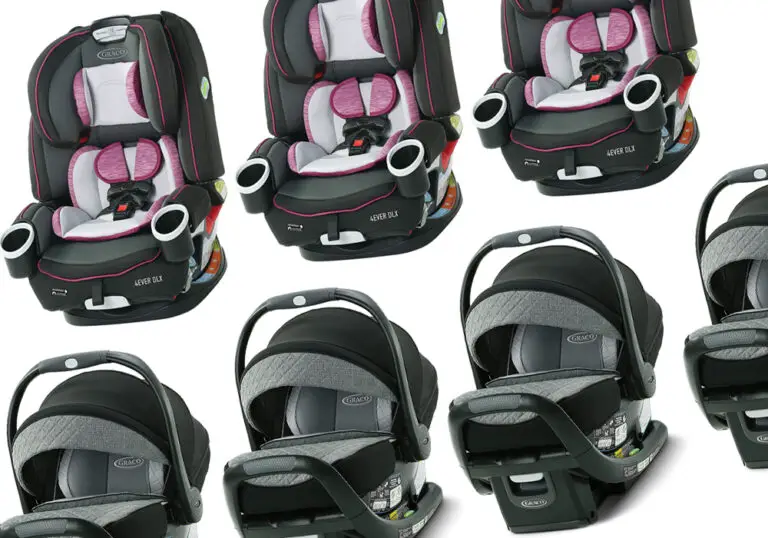Rhode Island Car Seat Laws 2024 (Rear, Forward & Booster)

The Rhode Island car seat laws are comprehensive and mandatory for motor vehicle operators to follow. Under the law, all children under the age of 8 years, standing less than 57 inches (4’9”) tall, and weighing less than 80 pounds have to be restrained in the back seat. The child restraint system must be federally approved.
- RI Rear-Facing Seat Law
- RI Forward-Facing Seat Law
- RI Booster Seat Law
- RI Child Front Seat Law
- RI Child Seat Belt Law
- RI Taxi Child Seat Law
- RI Ridesharing Seat Law
- RI Child Seat Repl. Law
- Leaving Child in Car in RI
- Choosing a Child Seat in RI
- Seat Installation Help in RI
Disclaimer: The content in this article does not constitute legal advice. It is solely for the purpose of providing information. The law is amended from time to time and the information in this article may not always be up to date. We recommend you to check the original source of the law.
Rhode Island Car Seat Laws
Rhode Island Rear-Facing Car Seat Law
According to the rear-facing car seat law in Rhode Island, all infants and toddlers less than 2 years of age or weighing less than 30 pounds must be restrained in a rear-facing car seat. (1)
The rear-facing position is the safest for children. However, they can quickly outgrow their infant seats. Hence, the rear-facing car seat age in Rhode Island is set at 2 years.
If you don’t obey the Rhode Island rear-facing child seat law, the police department will issue you a citation. You will then have to show proof of purchase of a federally approved car seat within 7 days. If you succeed, the citation will be voided. But if you don’t, you will have to appear in court and pay a fine of $85. (2)
Age: Newborn to 2 years
Weight: Less than 30 pounds
Penalty: $85
Rhode Island Forward-Facing Car Seat Law
According to the forward-facing car seat law in Rhode Island, children 2 years and older can use a forward-facing car seat with a harness if they have outgrown their rear-facing seat by height or weight. (1) The forward-facing seat should be used till the child exceeds the limits set by the manufacturer.
The forward-facing car seat age in Rhode Island is 2 years and older. Children should stay in the seat till they exceed the limits stated by the manufacturer. This generally occurs around age 7.
Disobeying the Rhode Island forward-facing child seat law carries a fine of $85. (2) You will have to pay this if you fail to show proof of purchase of a federally approved car seat within 7 days of getting a citation.
Age: 2 years and older
Penalty: $85
Rhode Island Booster Seat Law
According to the child booster seat law in Rhode Island, children younger than 8 years who have surpassed the weight and height limits of their forward-facing seats can ride in booster seats. (1)
Though the booster seat age in Rhode Island is not specific, children can ride on them until they turn 8 or weigh at least 80 pounds and are at least 4’9” tall. By this age, they are big enough for the seat belt to fit properly.
There are no prescribed Rhode Island booster seat requirements. But you can get a high-back or a backless booster seat so that the seat belt fits snugly across your child’s lap and shoulders. Failure to obey the law can cost you a citation and a fine of $85. (2)
Age: 2 years and older
Height: Shorter than 4’9”
Weight: Less than 80 pounds
Penalty: $85
Rhode Island Child Front Seat Law
According to the child front seat law in Rhode Island, a child younger than 8 years, shorter than 4 feet 9 inches and weighing less than 80 pounds must ride in the back seat in a federally-approved child restraint system. (1)
The front seat age in Rhode Island is 8 years. But the American Academy of Pediatrics recommends that all children under 13 years of age should ride in the rear seat. Hence, once the child reaches 8 years of age and meets the height and weight requirements, they can legally ride in the front seat.
Under Rhode Island state law, a child must be properly restrained in the front seat in two situations. One, the vehicle does not have a back seat, or two, all backseats are occupied by other children. (1) The front seat airbag must be deactivated. Violating the law will attract a penalty of $85. (2)
Age: 8 years and older
Height: 4’9” or taller
Weight: 80+ pounds
Penalty: $85
Rhode Island Child Seat Belt Law
According to the child seat belt law in Rhode Island, all children who have attained the age of 8 years but are younger than 18 years must wear an adult safety belt. (1)
This is compulsory, regardless of whether they are traveling in the backseat or the front seat. If the seat belt does not fit, they must wear a shoulder harness system.
The seat belt rules in Rhode Island are strict for both drivers and passengers. Hence, not wearing a seat belt as per Rhode Island children’s seat belt law will attract a fine of $40. (2) The motor vehicle operator carrying the child will be liable to pay.
However, these requirements only apply to motor vehicles that are required by federal law to have seat belts. Vehicles manufactured before July 1, 1966 are also exempt from this law. (1)
Age: 8 to 17 years
Penalty: $40
Rhode Island Taxi Child Seat Law
According to the taxi child seat law in Rhode Island, all children under the age of 8 years, shorter than 4’9” and weighing less than 80 pounds have to be restrained in a federally-approved child restraint system in the backseat. (1) A child passenger older than 8 years must wear a seat belt or a shoulder harness system.
The law does not mention who should provide a taxi child seat in Rhode Island. Ideally, you should arrange a car seat for your child or enquire with the taxi driver if they have one.
However, the motor vehicle operator is liable for the violation of Rhode Island car seat regulations. Hence, the taxi driver will be responsible if the child passengers are not safely restrained as per the law. The fine for disobeying the law is $85. (2)
Rhode Island Ridesharing Child Seat Law
There is no specific ridesharing child seat law in Rhode Island. When riding with your child in a rideshare service, all the Rhode Island child seat laws will apply. Children under 8 years of age have to be restrained in an appropriate child safety system. Those above 8 years but younger than 18 years must wear a seat belt or shoulder harness system. (1)
The law is unclear about who should provide the child seat. Nor does it say if ridesharing services such as Uber or Lyft are covered under its provisions. In such a scenario, either the parents or the rideshare drivers should provide a federally-approved child restraint system.
There is a penalty of $85 for not having a proper child restraint system. For eligible child passengers not wearing a seat belt, the penalty is $40. (2)
Rhode Island Child Seat Replacement Law
There is no child seat replacement law in Rhode Island. However, the National Highway Traffic Safety Administration (NHTSA) recommends that the child safety seat be replaced after an accident.
If your vehicle is involved in a moderate or severe accident in Rhode Island, you must replace the car seat. It must never be used again. However, there is no need to replace it after a low-impact accident. What qualifies as a low-impact crash can be determined with the help of certain questions.
Apart from child seat replacement after an accident, you must also replace the seat if it is too old. You can refer to the car seat manual to check how long the manufacturer recommends its usage. You should also replace the seat if it was recalled.
Leaving Child in The Car in Rhode Island
According to the law on leaving a child in a vehicle in Rhode Island, it is an offense to leave a child younger than 7 years unattended in a car. The offender will be given a verbal warning by law enforcement.
There are various dangers of leaving a child unattended in a vehicle. They can be kidnapped, have an in-car accident or set the car in motion. One of the major concerns is the accumulation of excessive temperatures within the vehicle. This may cause the child to suffer from a heat stroke.
Even though leaving a child in the car in Rhode Island only attracts a verbal warning, the offending parent/caregiver can be charged with child neglect. Given the dangerous consequences of the practice, children must never be left alone in vehicles.
Choosing a Child Car Seat in Rhode Island
Choosing a car seat in Rhode Island becomes easy when you simply follow the law. For infants and toddlers less than 2 years old or weighing less than 30 pounds, a rear-facing seat is the best car seat to use in Rhode Island.
When they outgrow their rear-facing seats, they should be placed in a forward-facing car seat. (1) These seats have a harness and tether that control the child’s forward movement.
If your child is shorter than 4’9,” weighs less than 80 pounds and has outgrown the limits of the forward-facing seat, they can move to a booster seat. For the best booster seat to use in Rhode Island, you can opt for a high-back or backless booster seat.
Car Seat Installation Help in Rhode Island
Every car seat and vehicle is different. You must read the seat’s instruction manual and the vehicle’s owner manual very carefully. Car seats are generally installed using either the lower anchors or the seat belt.
It is better to get your car seat checked by a certified child passenger safety (CPS) technician. To check your child passenger safety seats in Rhode Island, you can contact the State or Local Police Department.
Some of the places where you can get your car seat checked are:
- Cranston Police Department Traffic Unit
- The North Providence Police Department
- Portsmouth Police Department
- Safe Kids Rhode Island
- Lincoln Police Department
You can visit various locations to get your car seats checked.
Rhode Island Car Seat Safety Resources
You can use the following resources to know about child seat requirements in Rhode Island:
- State Police, Department of Public Safety
- Lifespan Health System: Founded in 1994 by Rhode Island Hospital and Miriam Hospital, Lifespan is the state’s first health system that offers comprehensive resources on child safety.
- Safe Kids Rhode Island: It provides training and workshops as part of the National Standardized Child Passenger Safety Training Program.
- Children First Pediatrics Inc
You can also refer to the following car safety resources:
- NHTSA Car Seat Installation Tips
- AAP Car Seats: Information for Families
- Safe Kids Worldwide: Car Seat Safety Tips
FAQ
How long should a child ride in a rear-facing car seat in Rhode Island?
Under the law in Rhode Island, a child must ride in a rear-facing car seat till they turn 2 years old and weigh more than 30 pounds.
Can you put a rear-facing car seat in the front seat in Rhode Island?
No, you cannot put a rear-facing car seat in the front seat. The only exception is when your vehicle does not have a back seat or all backseats are occupied.
Can you put a rear-facing car seat in the middle rear seat in Rhode Island?
You can put a rear-facing car seat in the middle rear seat but it should fit properly. You should check your vehicle’s as well as the car seat’s manual.
When can a baby face forward in a car seat in Rhode Island?
A baby can face forward in a car seat when they are older than 2 years and have outgrown the limits of their rear-facing car seat.
How old for a booster seat in Rhode Island?
There is no specific age under the law. But children can ride on booster seats till they turn 8 years old or are shorter than 4’9” and weigh less than 80 pounds.
When to use a backless booster seat in Rhode Island?
You can use a backless booster seat only if your vehicle seat has a head rest and the child’s ears are not higher than the seat back.
When can a child sit in the front seat in Rhode Island?
A child can sit in the front seat after they turn 8 years old. The adult seat belt should fit snugly across their lap and shoulders.
When can a child sit in the front seat with a booster in Rhode Island?
Ideally, children in a booster should ride in the back seat. You can place a booster seat in front if the car does not have a backseat.
When can a child stop using a booster seat in Rhode Island?
Under the car seat laws in Rhode Island, a child can stop using a booster seat when they are at least 8 years old, 4’9” tall and weigh at least 80 pounds.
When to switch from 5 point harness to a seat belt in Rhode Island?
The ideal time to switch from a 5-point harness to a seat belt is when the child has outgrown their booster seat and the seat belt fits them properly.
When can a child use a regular seat belt in Rhode Island?
As per the law in Rhode Island, children can wear a seat belt if they are at least 8 years old, or 4’9” tall and weigh at least 80 pounds.
Do you need a car seat in a taxi in Rhode Island?
Yes, you need a car seat in a taxi in Rhode Island. Either the parents/caregivers or the taxi driver can provide a federally approved car seat.
Do you need a car seat in a Uber in Rhode Island?
The law is not clear on this issue. But either the caregiver or the driver should provide a federally approved and appropriate car seat to ensure the child’s safety.
Do you need a car seat in a Lyft in Rhode Island?
The law is not clear on this issue. But either the caregiver or the driver should provide a federally approved and appropriate car seat to ensure the child’s safety.

Rishima Rawat
Rishima Rawat is a lawyer and legal writer with over six years of writing and legal experience. She earned her LLB degree from the West Bengal National University of Juridical Sciences, Kolkata. With a passion for child safety, she’s written extensively about the U.S. car seat laws in ParentingMode. She collaborates with businesses and law firms globally, enhancing their online content. Her insights are also published in legal journals like RGNUL, NLIU, and RMLNLU Law Review. Committed to the cause of education, she has volunteered with IDIA, which helps underprivileged children in India to access legal education. She has also worked with Enhelion Knowledge Ventures, a leading legal ed-tech platform in India that provides students with affordable courses in law. Fluent in English and Hindi with elementary proficiency in Spanish, Rishima combines her legal expertise with a dedication to child safety.






